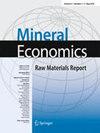The perils of ranking mining countries and regions: a critical look at the annual survey of the Fraser Institute
IF 3.5
Q1 ECONOMICS
引用次数: 0
Abstract
Abstract The attractiveness of mineral investments across countries and regions worldwide can be judged through various measures, each with its strengths and weaknesses. The purpose of this paper is to scrutinize the Fraser Institute’s ranking of mining jurisdictions, which builds on eliciting the perceptions of industry representatives around the world through an annual survey. The analysis takes stock in the growing scholarship on country performance indicators and concludes that due to the low response rate and the lack of clear definitions of some of the underlying concepts (e.g., political stability), there are reasons to question both the reliability and the validity of this survey. There could also exist incentives among exploration companies to “game” the rankings. For these reasons, the ranking outcomes do not constitute a meaningful scorecard that countries can employ to improve their mining-related policies. However, despite these deficiencies, the Fraser Institute’s survey often enjoys relatively uncritical media attention. It even sets in motion a political “rankings game” in which the mining companies, governments, and other organized groups choose to participate. There is an urgent need for a more reliable and unbiased survey approach, including the consideration of alternative—complementing—measures for assessing investment attractiveness in the mining industry.对矿业国家和地区进行排名的危险:弗雷泽研究所年度调查的批判性审视
世界各国和各地区矿产投资的吸引力可以通过各种指标来判断,每种指标都有其优缺点。本文的目的是仔细审查弗雷泽研究所对矿业管辖区的排名,该排名建立在通过年度调查征求世界各地行业代表的看法的基础上。分析总结了越来越多的关于国家业绩指标的研究成果,并得出结论认为,由于回复率低和对一些基本概念(如政治稳定)缺乏明确定义,有理由质疑这项调查的可靠性和有效性。勘探公司也可能存在“博弈”排名的动机。由于这些原因,排名结果不能构成一个有意义的记分卡,各国可以利用它来改善其与采矿有关的政策。然而,尽管存在这些缺陷,弗雷泽研究所的调查往往受到相对不加批判的媒体关注。它甚至启动了一个政治“排名游戏”,矿业公司、政府和其他有组织的团体选择参与其中。迫切需要一种更可靠和公正的调查方法,包括考虑评估采矿业投资吸引力的其他补充措施。
本文章由计算机程序翻译,如有差异,请以英文原文为准。
求助全文
约1分钟内获得全文
求助全文
来源期刊
CiteScore
5.00
自引率
12.00%
发文量
62
期刊介绍:
Mineral Economics – Raw Materials Report is an international multidisciplinary journal focused on economics and policy issues in the minerals metals and mining industries. The journal exists to improve the understanding of economic social environmental and political implications of natural resources. The main focus is on non-fuel minerals metals and the mining industry and its role in society.Mineral Economics is widening its scope and particularly invites papers on: Socio-economic aspects of mining e.g. social license to operate indigenous peoples theory of change Materials for the Green transition e.g. battery metals ICT elements policies to secure supply of these elements Minerals in the periphery e.g. the Arctic deep-seabed and space Mineral Economics serves as a platform for academics industry practitioners decision makers and other experts who want to share perspectives and knowledge about natural resources.A wide range of topics have traditionally been covered including among others: mineral market analysis exploration and development resource availability market development price formation international trade environmental policy sustainability issues competition issues.Mineral Economics is a joint project of Lule? University of Technology and R?varugruppen Ekonomisk F?rening the organization which founded the journal Raw Materials Report in 1981

 求助内容:
求助内容: 应助结果提醒方式:
应助结果提醒方式:


